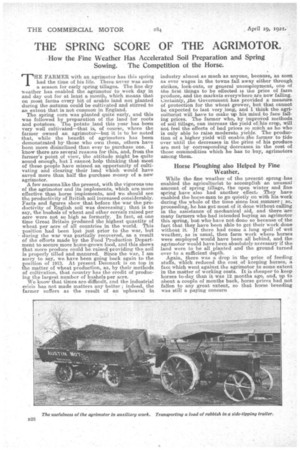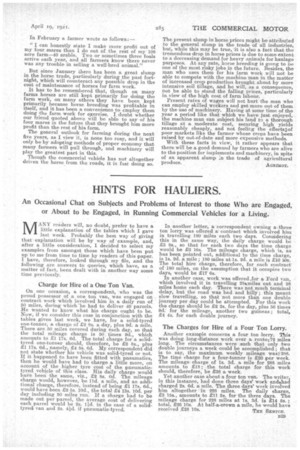THE SPRING SCORE OF THE AGRIMOTOR.
Page 24

Page 25

If you've noticed an error in this article please click here to report it so we can fix it.
.How the Fine Weather Has Accelerated Soil Preparation and Spring Sowing. The Competition of the Horse.
THE FARMER with an agrimotor has this spring had the time of his life. There never was such . a season for early spring tillages. The fine dry weather has enabled the agrimotor to work day in and day out for at least a month, which means that on most farms every bit of arable land not planted during the autumn could be cultivated and stirred to an extent that is not common in England. The spring corn was planted quite early, and this was followed by preparation of the land for roots and potatoes. The potato land this year has been very well cultivated—that is, of course, where the farmer owned an agrimotor—but it is to be noted that, while the benefit of agrimotors has been demonstrated by those who own them, others have been more disinclined than ever to purchase one. I know there are several reasons for this, and, from the farmer's point of view, the attitude might be quite sound enough, but I cannot help thinking that most of these people have missed an opportunity of cultivating and clearing their land which would have saved more than half the purchase money of a new agrimotor. A few seasons like the present, with the vigorous use of the agrimotor and its implements, which are more effective than horse implements, and we should see the productivity of British soil increased considerably. Facts and figures show that before the war the.pro&cavity of English soil was decreasing ; that is to say, the bushels of wheat and other cereals raised per acre were not so high as formerly. In fact, at one time Great Britain produced the highest quantity of wheat per acre of all countries in the world. This position had been lest just prior to the war, but during the war was partially recovered, as a result of the efforts made by the Food Production Depart-. meat to secure more home-grown food, and this shows that more produce could be raised providing the soil is properly tilled and manured. Since the war, I am sorry to say, we have been going back again to the position of 1913. At present Denmark is on top in the matter of wheat production, as, by their methods of cultivation, that country has the credit of producing the largest. number of bushels per acre. We know that times are difficult, and the industrial crisis Ilas not made matters any better ; indeed, the farmer suffers as the result of an upheaval in industry almost as much as anyone, because, as soon as ever wages in the towns fall away either through strikes, lock-outs, or general unemployment, one of the first things to be effected is the price of farm produce and the markets everywhere are now falling. t.Jertairdy, .he Government has provided a measure of protection for the wheat grower, but that cannot be expected to last very long, and 1 think the agriculturist will have to make up his mind to face falling prices. The farmer who, by improved methods of sail tillage, can increase the yield of his crop, will not feel the effects of bad prioes so much as he who is only able to raise moderate yields. The production of a higher yield will enabie the farmer to tide over until the decreases in the price of his produce are met by corresponding decreases in the cost of those commodities which he has to buy, agrimotors among them.
Horse Ploughing also Helped by Fine Weather.
While the fine weather of the present spring has enabled the agriculturist to accomplish an unusual amount of spring tillage, the open winter and fine spring have also had another effect: They have enabled the horse-man to go quietly on with his work during the whole of the time since last summer ; so, proceedingihe has got most of it done without calling in the assistance of mechanical aid, and there are many farmers who had intended buying an agrimotor this spring, but who have not done so because of the fact that they have been able to get their work done without it. If there had come a long spell of wet weather, as is usual, then farm work where horses were employed would have been all behind, and the agrimotor would have been absolutely necessary if the Land were to be all planted and the ground turned over to a sufficient depth.
Again, there was a drop in the price of feeding stuffs, which reduced the cost of keeping horses a fact which went against the agrimotor to some extent in the matter of working costs. It is cheaper to keep horses to-day than it was 12 months ago, and, up to about a couple of months back, horse prices had not fallen to any great extent, so that horse breeding was still a. paying concern In February a farmer wrcte as follows-:
"I can honestly state I make more profit out of my four mares than I do out of the rest of my 108 acre farm-40 arable. Two or sometimes three foals arrive each year, and all farmers know there never was any -trouble in selling a well-bred animal."
But since January ;here has been a great slump in the horse trade, particularly during the past. fortnight, which will counteract any possible drop in the cost of maintenance of horses for farm work.
It has to be remembered that, though on many farms horses are still kept primarily for doing the farm work, on many others they have been kept primarily because horse breeding was profitable in itself, and it has been a convenience to employ them doing the farm work for exercise. I. doubt whether our friend quoted above will be able to say of his four =rag in the future that they brought him more profit than the rest of his farm.
The. general outlook for farming during the next five years, as I view it, is none too rosy, and it will only be by adopting methods of proper economy that many farmers will pull through, and machinery will Play the greatest part in this.
Though the commercial vehicle has not altogether driven the horse from the roads, it is fast doing so. The present slump in horse prices might be attributed to the general slump in the trade of all industries, but, while this may be true, it is also a fact that the tremendous drop in horse prices is due to some extent to a decreasing demand for heavy animals for haulage purposes. At any rate, horse breeding is going to be one of the most risky jobs in the future. Besides, the man who uses them for his farm work will not be able to compete with the machine man in the matter of increased crop production brought about by more intensive soil tillage, and he will, as a consequence, not be able to stand the falling prices, particularly in view of the high cost of farm labour.
Present rates of wages will not hurt the man who can employ skilled workers and get more out of them by the use of machinery. Having at some time of the year a period like that which we have just enjoyed, the machine man can subject his land to a thorough tillage at a moderate cost, securing high yields reasonably cheaply, and not feeling the effect4of poor markets like the farmer whose crops have been raised by out-of-date and more expensive methods.
With these facts in view, it rather appears that there will be a good demand by farmers who are alive to the position for implements and machinery, in spite of an apparent slump in the trade of agricultural
produce. AGRIMOT.




























